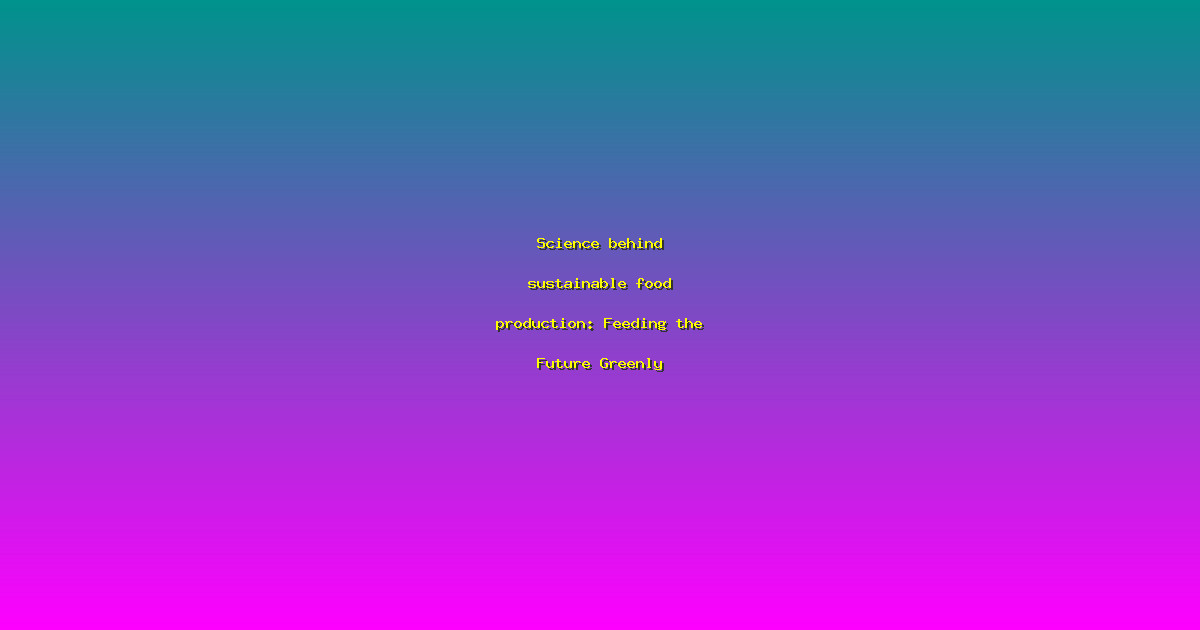Science behind sustainable food production: Feeding the Future Greenly
Imagine a world where food is abundant, nutritious, and produced without harming the environment. This vision is closer than you think, thanks to the science behind sustainable food production.
The global population is growing, and with it, the demand for food. Traditional farming methods often lead to soil depletion, water scarcity, and pollution. Sustainable food production offers a solution by integrating ecological principles into agricultural practices.
By adopting sustainable practices, we can ensure that future generations have access to healthy food without compromising the planet's resources. This article explores the science behind sustainable food production and how it can help us feed the world sustainably.
Understanding Sustainable Food Production
Sustainable food production is a holistic approach that aims to meet the nutritional needs of the population while preserving the environment. It involves a variety of techniques and technologies designed to minimize the ecological footprint of agriculture.
Key Techniques in Sustainable Food Production
- Agroforestry: Integrating trees into farming systems to improve soil health and biodiversity.
- Organic Farming: Using natural methods to control pests and diseases, avoiding synthetic chemicals.
- Conservation Agriculture: Minimizing soil disturbance, maintaining soil cover, and rotating crops to enhance soil fertility.
- Vertical Farming: Growing crops in vertically stacked layers, often in controlled environments, to save space and resources.
Benefits of Sustainable Food Production
Implementing sustainable practices can lead to numerous benefits:
- Environmental Conservation: Reduces pollution, conserves water, and preserves biodiversity.
- Economic Viability: Increases long-term profitability and reduces dependency on external inputs.
- Social Equity: Supports local communities and promotes fair labor practices.
Challenges and Solutions
Despite the benefits, sustainable food production faces challenges such as high initial costs and the need for specialized knowledge. However, with government support, education, and technological advancements, these obstacles can be overcome.
Key Takeaways
Adopting sustainable food production methods is crucial for ensuring food security and environmental sustainability. By integrating science and technology, we can create a more resilient and equitable food system.
FAQs
What is sustainable food production?
Sustainable food production is an approach that aims to meet the nutritional needs of the population while preserving the environment.
How does sustainable food production benefit the environment?
It reduces pollution, conserves water, and preserves biodiversity, leading to a healthier ecosystem.
What are some examples of sustainable farming techniques?
Examples include agroforestry, organic farming, conservation agriculture, and vertical farming.
Is sustainable food production economically viable?
Yes, it can be economically viable in the long term by reducing dependency on external inputs and increasing profitability.
How can individuals support sustainable food production?
By choosing sustainably produced food, supporting local farmers, and advocating for policies that promote sustainable practices.
Conclusion
The science behind sustainable food production offers a promising path to feeding the world while protecting our planet. By embracing these practices, we can ensure a sustainable future for generations to come. Learn more about sustainable food production and how you can contribute to this vital cause.

